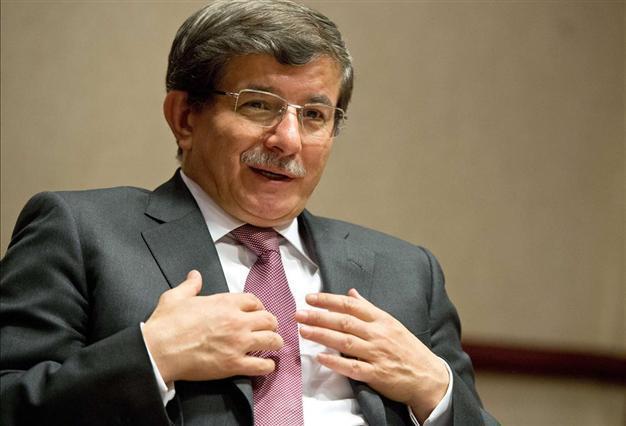No tolerance for militants headed to Syria, Turkish FM Davutoğlu says
WASHINGTON

Turkish Foreign Minister Ahmet Davutoğlu speaks to reporters at the Turkish embassy in Washington on Nov 18, 2013 following talks with US officials. AFP PHOTO
Foreign Minister Ahmet Davutoğlu pushed back Nov. 18 against allegations that Turkey has not cracked down hard enough on extremists crossing its border to fight in Syria’s civil war while calling for greater intelligence cooperation.
Turkey has been accused of harboring rebels associated with al-Qaeda who operate across the border in Syria, but Foreign Minister Davutoğlu insisted his country had no tolerance for extremists and likened the situation to problems on the U.S. border with Mexico.
“In no way Turkey tolerates or will be tolerating any extremist groups crossing Turkish borders,” Davutoğlu told reporters at a briefing at the Turkish Embassy in Washington. He said such reports were exaggerated and if Turkey closed its borders, it would be criticized for blocking humanitarian aid flowing into Syria and keeping refugees out.
‘How can we check tourists?’The top diplomat said Western countries that were asking Turkey to do more to prevent extremists from crossing from Turkey into Syria must stop them from arriving in Turkey in the first place. “There are 4 million tourists coming to Turkey. How can we check each of these tourists? We cannot act against human rights,” he said. “If those countries know who they are, they should stop them or they should give us a list.”
Earlier in the day, Secretary of State John Kerry said he and his Turkish counterpart discussed ways that both countries could tackle the rise of extremism in the region. “The United States is working extremely closely on a daily basis with their officials and ours,” Kerry said. “We have consistent sharing of intelligence. We work on strategy. We are both involved in the challenges of the borders with respect to humanitarian assistance.”
US Patriots to remainDuring his visit with Defense Secretary Chuck Hagel, Davutoğlu discussed the U.S. decision to continue to provide two Patriot missile batteries in Turkey for another year as part of that country’s air defenses while the civil war rages on in Syria. Hagel told the foreign minister the United States would keep its two Patriot missile batteries in Turkey for up to another year, the Pentagon said.
“The United States has decided to continue its contribution of two Patriot batteries under NATO command and control for up to one additional year, in response to Turkey’s request,” the Defense Department said in statement after Hagel met with Davutoğlu at the Pentagon.
Missile deal with China not finalDavutoğlu also discussed with U.S. officials his nation’s recently announced plan to begin talks with the China Precision Machinery Export-Import Corp. (CPMIEC) on the purchase of a long-range missile system. The $3.44 billion deal surprised many and strained relations between Turkey and its NATO allies. Davutoğlu told reporters the decision was not final.
“It’s a competition. If there is a new proposal satisfying our needs by an American company or a European company, we will make this deal with them,” he said. Then he added: “But this started in 2009. For four years, nobody raised any concern. Nobody said this is not good for NATO.”
CPMIEC, which makes the HQ-9 missile system, beat out competition from a U.S. partnership of Raytheon and Lockheed Martin, Russia’s Rosoboronexport, and Italian-French consortium Eurosam for the deal, estimated at $4 billion.
The United States has complained that the Chinese system would not be compatible with other systems used by Turkey’s NATO allies. But Davutoğlu said there was “no political or ideological dimensions” to Turkey’s choice of the Chinese company, saying it had purely been based on Ankara’s three main criteria.
“We have three basic criteria, one is joint production the most important criteria because we want these [...] to be developed in Turkey and this is a very valid request,” the minister told reporters. “Second is delivery time, because there are so many crises around Turkey and we want to have this system as early as possible, and third is the price.” He stressed that Turkey would prefer to have a system from the United States and its NATO allies, but said that in the tendering process the American bid had come third behind both its Chinese and European competitors. Turkish officials said there had been some indications in their meetings in Washington that the U.S. bid could be modified to address Ankara’s concerns.
Peace process and IranApart from Syria, Davutoğlu also discussed the peace process in Turkey and Iran. Kerry said the U.S. was particularly encouraged by the historic Kurdish peace process. “I should say – we hope agreement – the Turkish process and the recent announcement by Turkey of several domestic reforms. Implementing these changes will spur greater openness and greater freedom in Turkish society, which the former – the Foreign Minister and the Prime Minister completely embrace, and which we encourage them and commit to working with them in order to try to promote going forward,” Kerry said.
On Iran, Davutoğlu said Turkey supported the negotiation process. “We don’t want any state obtaining nuclear weapons. But at the same time, we are in favor of peaceful access to nuclear technology. So based on these two principles, we will always support P5+1 Iran negotiations,” Davutoğlu said.
The P5+1 and Iran are set for the next round of talks on November 20 in Geneva.
